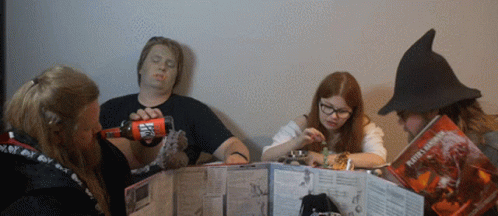Especially after the holiday seasno we have just had, many of you might be sitting with one or more new systems to pick up, which can be very daunting. Trust me, I know this all too well. In the last 3 months I have learned how to play Warhammer: Wrath and Glory, Vampire the Masquerade, Pathfinder 1e and 2e, and Traveller 2022 edition. That's a LOT of systems of various levels of complexity.
Now, do I know every single thing in them like I do in D&D or Call of Cthluhu? No! However, there's a few things I learned that I do to help me pick up a system to a basic level of competency so that I can play it with some of my amazing patient players who are keen to try out a new thing once in a while.
So let's get started with it!
Learning the essentials
I've learned that certain things in TTRPGs are almost constants. For example, I come from a game design background, and over the years we have developed a 'game langauge' that we intuitively understand when playing a new game. Whether it's a new or old release, on PS5 or Xbox, most gamers will immediately understand many elemetns of the User Interface of a game. This is because we have developed a language that acts as a constant, and TTRPGs are no different.
For me, most of the constants I have identified (and almost the main/ most frequernt things players will do) are:
- Skill or ablility checks/ saves
- Combat
- HP changes (loss, gaining and death)
In no particular order, these are the 3 constants in almost every single game I have played ever, and noticed recently. This doesn't mean that there isn't other rules or systems that you need to know, but if you know these I feel your are pretty much prepared to run a game and pick up the rest as you go.
For example, character creation is FUNDAMENTAL to many game systems, but if a rulebook is written well enough or if the system is simple, you can afford to learn this at a Session Zero with your players. Make it part of the fun for all of you to pick up and learn these systems.
In addition, player advancement/ leveling up/ gaining new skills is also one of the biggest drawing factors to many games. However, you can figure this out BETWEEN sessions, and when your players regroup, you can level them up then.
Avoiding analysis paralysis
The thing that I see all the time in and outside of the TTRPG space is 'analysis paralysis'. This is where you spend infinite amounts of time pining of tiny details and never actually 'doing' anything. I've experiecned this many times and used to chalk it up to being either worried about not doing a good job, or feeling like I had to be perfect at knowing the rules for games before running them.
Well, the reality I've experienced is no matter how many times you read over a rule, you are more than likely either going to remember certain rules wrong, mix them up with another system, or forget them entirely - ESPECIALLY if you do not play the game right after reading it.
Maybe now is the time to bullet up your concept. Make 5-10 bullets and see if things fall into place. Once you feel confident in a short game for your players, it's maybe now time to...
Look at the lore
Once you've conquered the 'core three', now's the time to really dive into some lore - but only if you want to.
Some games are heavily tied to their own lore, such as Warhammer: Wrath and Glory or the Alien RPG. So for me, these systems (particularly Alien) are better if you have some background knowledge of the setting which can be found int he Core Rulebooks for these games. Bigger systems like D&D, Pathfinder, Traveller or especailly Vampire the Masquerade may have significant info that could be useful to learn before a game. Again though, in the worst case scenario, you can wing the details during a game.
To take things to the other extreme, it's important to remember that game systems are that - systems. This means you can use all of the rules and make up your settings, borrow some aspects of the main game, or mix and match - you can do what you like!
For example, my 2 year D&D campaign is not set in the universe that Wizards of the Coast published, but in my own more lethal world. I didn't do this out of some desire to create an expansive world, but more because it let me skip large amounts of reading into the D&D universe, including the Gods, how magic works, the planes etc. In addition, making my own thing means I can make life easy for myself. I make only what's needed for a new game or session (usually in 1-3 game increments), and then I adapt the world based on the players. This almost always makes a more interesting setting for me to run, and for my players to interact with.
If you don't want to use the setting in your core rulebooks, or make your own, you can always borrow from books or films you've experienced.
For me, the big thing about lore in the early stages is to give players what they need to know. You can always retcon or expand in later games. As I've said, make it easy for yourself as players will likely never learn it all, or even see most of it if they are anything like the 4 or 5 groups I regularly play with!!
Try a game
Trying a game can now be done. The key things to set up in my experience are:
- Find keen players, letting them know it's a NEW game, and we'll be learning as we go.
- Grab some pregens, or make your own (if you make your own, you'll inheriantly pick up things about the system)
- Run a one-shot. Don't bother trying to run big games at this stage. It's not impossible, but I've seen many great GMs I know personally trip up and stress themselves out because they've tackled a game that requires too much work for too new of a GM. Keep it easy for yourself!
I've found that asking players to 'try out' something new and keeping the 'commitment' level and 'severity' of the game light, many people would be up for sacrificing one single evening to a game. Players knowing that they won't feel silly for not knowing the rules, but instead encouraged to join for a fun new game, and that mistakes will be tolerated is also a more relaxed environment to play in.
Regarding pregens, having them and telling your potential players "don't worry about needing to read through character creation, I have some guys for you to pick from" can masively reduce the 'effort' your game sounds like it could be. Obviosuly some people love character creation, so the offer for people to make their own characters should be there, but backup characters if they die can never go amiss.
Much of my advice here, if you have seen the theme, is to keep things easy on you. However, I think this is equally true of your players who may normally need to work a little harder when trying to learn a new system and roleplay within it! There's no harm in keeping things feeling easy.
Repeat
Just keep doing this, and you'll start to pick up new rules as you go, or learn that you didn't get certain rules right the first time, which you can amend for your next game. Wrath and Glory was a great example of this for me, where I must have been overwhelmed with a very new system, the language of the game, and how combat works.
For example, I got basic things of combat completely wrong due to my ignorance of the rules. I knew this going in however, so my eager group of players generously let me fumble a bit with the rulebook. For things I couldn't find quickly, or just couldn't be bothered looking up, I ran with rules that made sense to me and my players to keep the pace up. In the end, I found out I had various things wrong but just let my players know "it's OK! we'll change it next time!". After 3 or 4 games we now play the game competently and have a blast doing it.
So, anything else?
The best way to learn is through experience, so get out there and play some new games! I'm a firm believer that trying a bunch of systems is an effective way to make you a better GM, as new rules and perspecitves may help you learn new ways to tell your stories that is more engaging to the players.
Alien for example almost discourages rolls as the penalty of failure can be deadly when a player's Stress level is high. By proxy, this discourages you from asking for pointless rolls where a player may be more-than-qualified to do a menial task. Alien's rule is similar to "if there's no consequence of failure, don't ask for the check".
Wrath and Glory heavily leans on 'if it's cool and keeps the story going in a way that affects your players positively, just do it!'. Even Vampire, a rules heavy horror game says their rules should not get in the way of a damn good game!
Learning various new systems helped me not only learn how to pick up games faster, but positively impacted my ability to run all games I played.
I hope that some of the tips on this post are useful to you, and if there's anything you would like to contribute please send a comment below.
Thanks for spending the time to read this post, and until the next one, have some great games!
-KJ







Comments
Post a Comment
Thanks for leaving a comment!